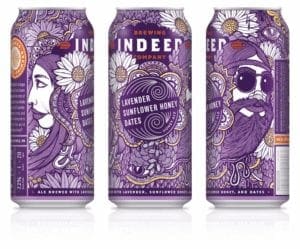Brewery Forced to Drop ‘LSD’ From Label—In America!
This article was featured in our weekly newsletter, the Liberator Online. To receive it in your inbox, sign up here.
The war on drugs has finally gone too far.
 Indeed Brewing, a Minneapolis-based brewery, was recently forced to change the name of their LSD Ale after federal regulators thought it sounded too offensive.
Indeed Brewing, a Minneapolis-based brewery, was recently forced to change the name of their LSD Ale after federal regulators thought it sounded too offensive.
Everything had been going alright for Indeed Brewing while it was only selling its products in Minnesota. But the moment the company decided to start selling LSD Ale across state lines, things went sour.
Once the company started working on the licenses needed to expand and start selling outside of the state, federal regulators realized the beer presented a “threat.” The result? Indeed Brewing had to drop the name or stop expansion.
In an attempt to comply without having to drop the product’s name altogether, Indeed Brewing decided to try different hippie-themed labels that kept the beer’s name somewhat under the radar. That didn’t work.
“Unfortunately,” Indeed Brewing co-founder Thomas Whisenand said, “we sell a regulated product and there’s not much you can do when the feds say no.”
To appease federal regulators, the company had to change the ale’s name to Lavender, Sunflower Honey, Date Honey, dropping the terrifying LSD from its labels.
While the name may sound terrifying to some, it does not indicate that the beer is indeed made with LSD. Watchdog.org reports that, if the beer was, indeed, made with LSD, federal regulators would be concerned with things other than the ale’s name. So why are the feds so invested in how the manufacturers chose to advertise the beer?
In the past, multiple states banned the sale of Founders Brewery’s Oatmeal Breakfast Stout because of the baby that appears on the label. According to the Michigan Liquor Control Commission, the advertisement of alcoholic beverages “shall not depict or make reference in any manner to minors,” which prompted the state to ban the sale of the product locally. But what exactly is Indeed Brewery doing wrong?
Nothing, really.
According to research carried out by the Mercatus Center, barriers raised by the federal and state governments are hurting small breweries more than ever, which hurts consumers as a result. Even if the problem is not drug-related, governments will always find something to pick on. It might be a drug-sounding name, or that you do not have a hood for a food oven in your brewery, even though you do not produce food. Or perhaps the fact that your small craft brewery does not have the equipment to handle raw chicken, even though poultry is not an ingredient to any of your products.
According to Mercatus researchers, brewers often face high costs and long waiting times when attempting to obtain a seal of approval from state and federal governments. As associated costs also rise, brewers are often barred from entering the market simply because they cannot afford to meet the unreasonable standards provided by regulators.
In Virginia, for instance, regulators are authorized to deny a small brewer a license because he or she is “physically unable to carry on the business,” or is incapable of speaking, understanding, reading, and writing “the English language in a reasonably satisfactory manner.”
What that even means is beyond reason.




















